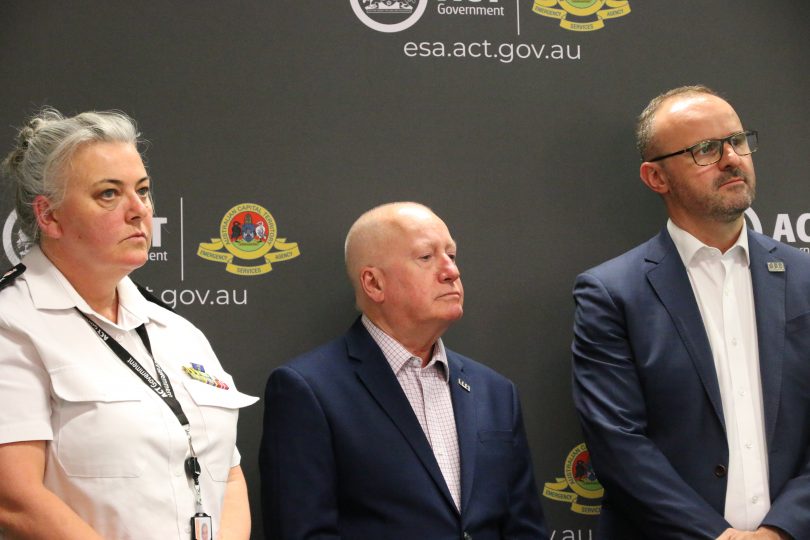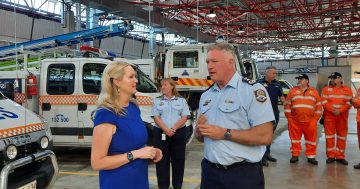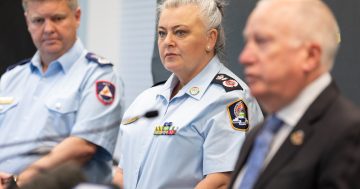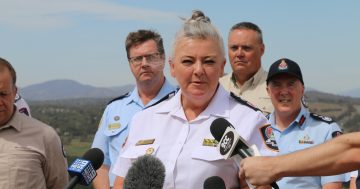
ACT Minister for Police and Emergency Services Mick Gentleman (centre, flanked by Emergency Services Agency Commissioner Georgeina Whelan on left, and ACT Chief Minister Andrew Barr on right) says the adoption of all 35 recommendations from the Emergency Services Agency review into the past summer’s bushfire response will leave the ACT better prepared for upcoming bushfire seasons. Photo: Dominic Giannini.
The ACT Government will adopt all 35 recommendations from the recent inquiry into the Territory’s emergency services bushfire response handed down by Deputy Emergency Services Commissioner Ray Johnson.
The recommendations include better cross-border operability of a fires-near-me app for the ACT and NSW; efforts to build trust between ACT Rural Fire Service (RFS) and ACT Parks and Conservation Service firefighters; and an education program to expand the role of the ACT RFS.
ACT Minister for Police and Emergency Services Mick Gentleman said the changes improve the Territory’s emergency management system and preparedness for future bushfire seasons.
“Changes to the Emergencies Act 2004 streamline and clarify the appointment, function and powers of the emergency controller and will help foster a culture of continuous improvement,” he said.
“The maximum period an emergency controller may be appointed has been extended from seven to 28 days when a state of emergency has not been declared. There is no limit to how long an emergency controller may be appointed during a state of emergency.
“The changes will also allow for the appointment of a deputy emergency controller. We have seen the enormous strain on emergency controllers in 2020. This support role will provide them with backup and relief when needed.”

The Orroral Valley bushfire was the worst blaze the ACT has experienced since 2003. Photo: Gary Hooker.
The morale of volunteer RFS firefighters in the ACT was at record lows, a parliamentary inquiry has heard, hearing reports of volunteers being sidelined during the Orroral Valley bushfire in January and February, 2020.
Elevating RFS volunteers to be a part of incident management teams (IMT) was also recommended in the operational review of the Emergency Services Agency (ESA).
While ESA Commissioner Georgeina Whelan told the inquiry into emergency services’ response to the 2019-2020 bushfire season, last week, that all RFS members are trained appropriately for their roles, although being incorporated into an incident management team requires extra training.
Paid staff usually require years of on-the-job experience to achieve incident management training certification.
The ESA will look at alternative options for volunteers, including a training model that works across weekends, said Commissioner Whelan.
“For us, what we will need to do is look at how we can deliver that training to a volunteer workforce,” she said.
“The incident management training is block training; it goes over an extended period of time and requires many hours of on-the-job training to receive the certification.”
A further concern for the RFS was the urgent duty-driving training for volunteers after they were told not to use lights and sirens on firetrucks last bushfire season because they were not trained to do so.
A detailed training strategy operating over 12-18 months will address these issues, said Commissioner Whelan.
“In addition, we have added three more positions to increase the sub-specialisation of RFS staff, which, in turn, will support the ongoing professional development and training and ongoing support provided to RFS volunteers,” she said.
Under the adopted recommendations, the Chief Minister and Minister for Police and Emergency Services will be updated at least every seven days about the state of alert or emergency by the emergency controller, and assess whether it is still necessary.
This year, the ACT entered its first state of emergency since 2003 due to the catastrophic conditions during the bushfire season.




















